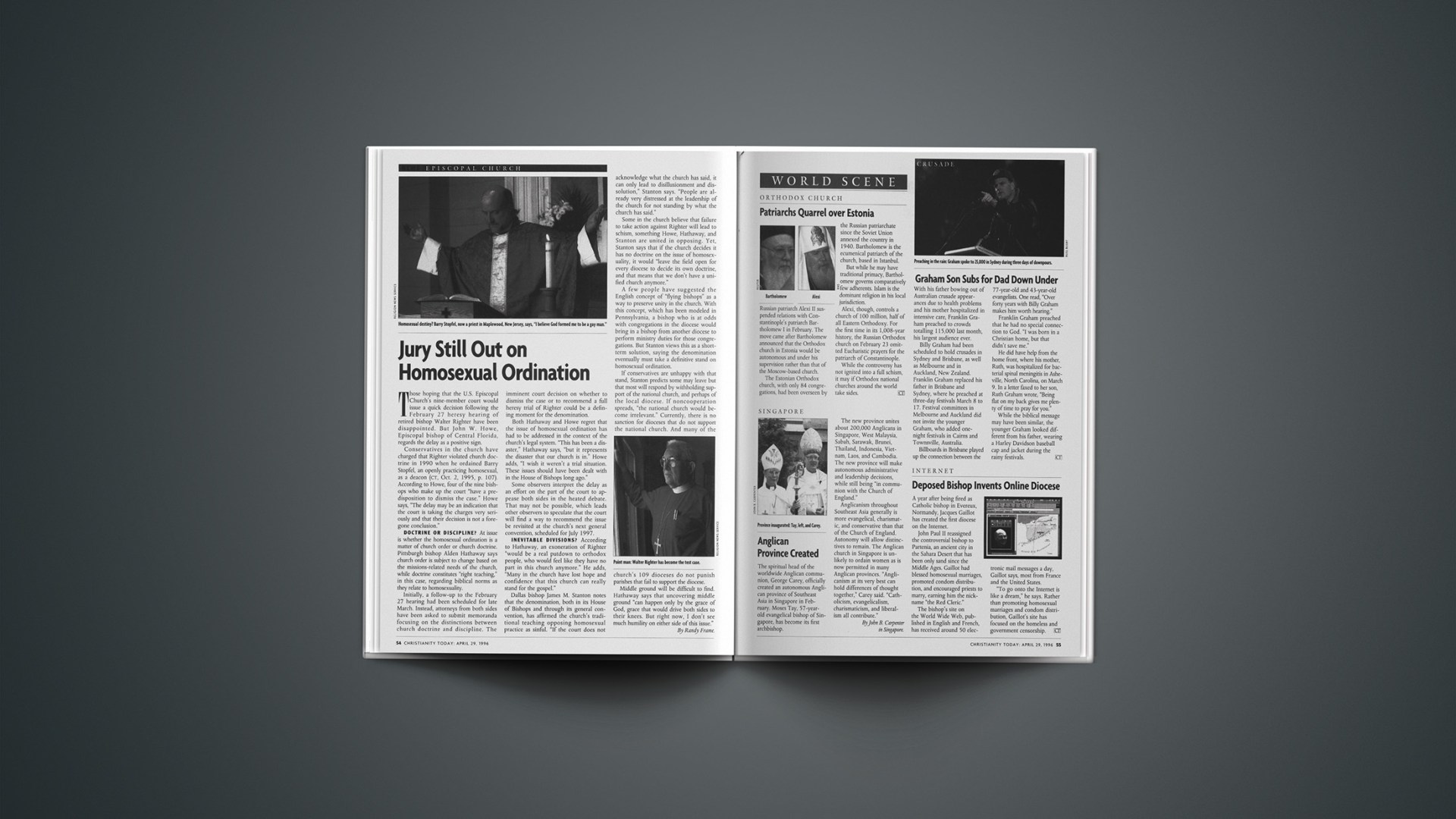Those hoping that the U.S. Episcopal Church’s nine-member court would issue a quick decision following the February 27 heresy hearing of retired bishop Walter Righter have been disappointed. But John W. Howe, Episcopal bishop of Central Florida, regards the delay as a positive sign.
Conservatives in the church have charged that Righter violated church doctrine in 1990 when he ordained Barry Stopfel, an openly practicing homosexual, as a deacon (CT, Oct. 2, 1995, p. 107). According to Howe, four of the nine bishops who make up the court “have a predisposition to dismiss the case.” Howe says, “The delay may be an indication that the court is taking the charges very seriously and that their decision is not a foregone conclusion.”
DOCTRINE OR DISCIPLINE? At issue is whether the homosexual ordination is a matter of church order or church doctrine. Pittsburgh bishop Alden Hathaway says church order is subject to change based on the missions-related needs of the church, while doctrine constitutes “right teaching,” in this case, regarding biblical norms as they relate to homosexuality.
Initially, a follow-up to the February 27 hearing had been scheduled for late March. Instead, attorneys from both sides have been asked to submit memoranda focusing on the distinctions between church doctrine and discipline. The imminent court decision on whether to dismiss the case or to recommend a full heresy trial of Righter could be a defining moment for the denomination.
Both Hathaway and Howe regret that the issue of homosexual ordination has had to be addressed in the context of the church’s legal system. “This has been a disaster,” Hathaway says, “but it represents the disaster that our church is in.” Howe adds, “I wish it weren’t a trial situation. These issues should have been dealt with in the House of Bishops long ago.”
Some observers interpret the delay as an effort on the part of the court to appease both sides in the heated debate. That may not be possible, which leads other observers to speculate that the court will find a way to recommend the issue be revisited at the church’s next general convention, scheduled for July 1997.
INEVITABLE DIVISIONS? According to Hathaway, an exoneration of Righter “would be a real putdown to orthodox people, who would feel like they have no part in this church anymore.” He adds, “Many in the church have lost hope and confidence that this church can really stand for the gospel.”
Dallas bishop James M. Stanton notes that the denomination, both in its House of Bishops and through its general convention, has affirmed the church’s traditional teaching opposing homosexual practice as sinful. “If the court does not acknowledge what the church has said, it can only lead to disillusionment and dissolution,” Stanton says. “People are already very distressed at the leadership of the church for not standing by what the church has said.”
Some in the church believe that failure to take action against Righter will lead to schism, something Howe, Hathaway, and Stanton are united in opposing. Yet, Stanton says that if the church decides it has no doctrine on the issue of homosexuality, it would “leave the field open for every diocese to decide its own doctrine, and that means that we don’t have a unified church anymore.”
A few people have suggested the English concept of “flying bishops” as a way to preserve unity in the church. With this concept, which has been modeled in Pennsylvania, a bishop who is at odds with congregations in the diocese would bring in a bishop from another diocese to perform ministry duties for those congregations. But Stanton views this as a short-term solution, saying the denomination eventually must take a definitive stand on homosexual ordination.
If conservatives are unhappy with that stand, Stanton predicts some may leave but that most will respond by withholding support of the national church, and perhaps of the local diocese. If noncooperation spreads, “the national church would become irrelevant.” Currently, there is no sanction for dioceses that do not support the national church. And many of the church’s 109 dioceses do not punish parishes that fail to support the diocese.
Middle ground will be difficult to find. Hathaway says that uncovering middle ground “can happen only by the grace of God, grace that would drive both sides to their knees. But right now, I don’t see much humility on either side of this issue.”
Copyright © 1996 Christianity Today. Click for reprint information.










